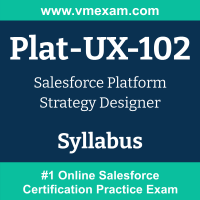 The Salesforce Plat-UX-102 exam preparation guide is designed to provide candidates with necessary information about the Platform Strategy Designer exam. It includes exam summary, sample questions, practice test, objectives and ways to interpret the exam objectives to enable candidates to assess the types of questions-answers that may be asked during the Salesforce Certified Platform Strategy Designer exam.
The Salesforce Plat-UX-102 exam preparation guide is designed to provide candidates with necessary information about the Platform Strategy Designer exam. It includes exam summary, sample questions, practice test, objectives and ways to interpret the exam objectives to enable candidates to assess the types of questions-answers that may be asked during the Salesforce Certified Platform Strategy Designer exam.
It is recommended for all the candidates to refer the Plat-UX-102 objectives and sample questions provided in this preparation guide. The Salesforce Platform Strategy Designer certification is mainly targeted to the candidates who want to build their career in Salesforce Designer domain and demonstrate their expertise. We suggest you to use practice exam listed in this cert guide to get used to with exam environment and identify the knowledge areas where you need more work prior to taking the actual Salesforce Platform Strategy Designer exam.
Salesforce Plat-UX-102 Exam Summary:
|
Exam Name
|
Salesforce Platform Strategy Designer |
| Exam Code | Plat-UX-102 |
| Exam Price |
Registration fee: USD 200 Retake fee: USD 100 |
| Duration | 105 minutes |
| Number of Questions | 60 |
| Passing Score | 70% |
| Recommended Training / Books |
Prepare for Your Platform Strategy Designer Credential Salesforce Platform Strategy Designer Certification Prep |
| Schedule Exam |
Kryterion Webassessor PEARSON VUE |
| Sample Questions | Salesforce Plat-UX-102 Sample Questions |
| Recommended Practice | Salesforce Certified Platform Strategy Designer Practice Test |
Salesforce Platform Strategy Designer Syllabus:
| Section | Objectives | Weight |
|---|---|---|
| Value Design |
- Given a customer scenario, create an effective challenge statement that pairs a business objective with a user problem, to frame the altitude and scope of a design project. - Based on the challenge statement created, identify the metrics and signals that will define success. - Given a customer scenario, evaluate how the internal dynamics of the organization might impact your recommendation on the right approach to solving the challenge statement. - Given a scenario, explain how key external context for innovation might influence or impact the organization's strategy. - Defend the rationale for strategic directions, including how they satisfy business and user needs, and future implications. - Given a customer scenario, advocate for ethics and values on behalf of both users and the organization. |
32% |
| Tools and Artifacts |
- Given a business need, connect user needs to high-level Salesforce capabilities. - Given a customer scenario, determine the criteria for feasibility, desirability, and viability within a user experience. - Given a customer scenario, identify the best methods of co-creation to employ with customers and stakeholders. |
23% |
| Intangible Deliverables |
- Given a scenario, craft a strategy to create alignment. - Given evolving internal dynamics, identify the key relationships needed to solve the challenge statement. - Given an audience description, identify the best presentation techniques for communicating a vision. - Given a scenario, utilize the tools for productive cross-discipline collaboration. |
26% |
| Leveraging Adjacent Roles/Skills |
- Given an aligned vision, create a roadmap for implementation that is feasible and holds true to the vision in every iteration. - Given a scenario, determine the technical and business capabilities that underpin the delivery of vision to solution. - Given a scenario of disparate business and technical deliverables within a design/build team, facilitate productive collaboration. - Given a scenario, determine the knowledge and skill infusions needed in the creation of a vision. |
19% |
